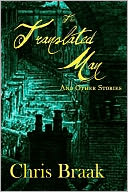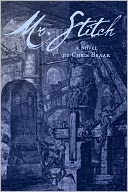David Soyka Reviews The Translated Man and Other Stores and Mr. Stitch


The Translated Man and Other Stories Threat Quality Press (224; 11.99 USD; softcover 2007)
Mr. Stitch Threat Quality Press (248; 11.99 USD; softcover 2010)
Chris Braak
Chris Braaks’s duology featuring Detective-Inpector Elijah Beckett demonstrates that you can tell a book by its cover. These book jackets are dark, primitive and ugly; the novels are set in a steampunk Victorian metropolis called Trowth that is equally dark, primitive and ugly.
It was early morning and the strained watery light that flickered off the mountain of stormy architecture of Trowth did little to alleviate the cold, though it was actually one of the
warmest periods of the day — when warm air swept briefly in from the sea — and the late afternoon were the only times during Second Winter that pedestrians were common; a small, muted collection of passers-by and vendors had tentatively come out into the cold streets above St. Dunsany’s. The air was just barely
tolerable, and tasted faintly of salt and fish. Even the normally antisocial and solitary citizens of the city would take the time to wander about for a few hours, trying to catch a fleeting glimpse of the sun.
ps.52-53 (Mr. Stitch)
What we have here is a police procedural that mixes Sherlock Holmes and H.P. Lovecraft. I’m not much a fan of either (I know, how could I possibly be allowed on the BG staff, but mistakes happen). Nor do I much care for plotting littered with flaws in logic (a character can pick the lock of a room to steal papers without ever thinking they might be noticed missing, but apparently doesn’t think for a second to pick the lock of a suitcase she is forced to deliver to a train station to see if it contains anything potentially explosive, which, of course, it does) that hinges on fantastical mysteries with improbable coincidences (even if they take place in the context of an improbable reality) that seemingly have little point beyond giving the intrepid characters something to do so they can preserve civilization as they know it (though in this case, “civilization” is a questionable term).
That said, I thoroughly enjoyed this short series, mainly because of the characters. Beckett is dedicated to his career as a Coroner, an elite force with a license to kill at will heretics and the consequences of their heretical metaphysical experiments. He also suffers from the “fades,” a disease contracted by factory work as a child that results in deteriorating flesh (he wears a scarf to hide the missing half of his face) and drug addiction to control the pain. Of course, every detective needs a fearless sidekick to fight the forces of evil. Beckett has two. Valentine Vie-Gorgon, an absent-minded aristocrat dabbling as a police functionary, and Elizabeth Skinner, a blind “knocker” aetherically equipped with telekinetic abilities that serve as a sort of radar to detect unchartered passageways and conspirators in hiding.
But the most interesting character of all is the city of Trowth, a mess of overbuilt, over thought architecture that results in dangerous labyrinths that connect ghettos of unusual creatures pressed into subservience to the human overlords.
It was almost evening when Beckett emerged from the depths of the Arcadium. The sky has turned from a dull, dark, sooty gray to a duller, darker sootier gray, redeemed only by the fact that looking at it no longer caused migraines. The perpetual cloud of thick, puissant smoke, spewed out by factories that burned phlogiston and flux and coal, hung low over the stony war of parapets, crenulations, buttresses, towers and arches that composed Trowth’s skyline.
p. 7 (The Translated Man)
The titles of both books refer to persona that, while vital to the plot resolution, are comparatively minor and undeveloped players in the narrative until the denouement. You should read The Translated Man first, though, no big loss in comprehension if, like me, you start with Mr. Stitch. The title of the first book refers to creature(s?) stuck in some kind of dimensional anomaly caused by an aethyrship built by a misguided scientist seeking to end a horrible war fought over energy supplies (Braak does sneak in some social commentary). Mr. Stitch is Beckett’s boss, a reanimate who like the Boris Karloff Frankenstein’s monster is visibly stitched together from various ill-fitting body parts. In the second book, the war has ended, but the social divisions have, if anything, heightened. Now that the men are back from the war, women are barred from working (like I said, Braak slips in some social commentary), which means Skinner is, much to Beckett’s dismay, forcibly retired. To fend off homelessness, Skinner is persuaded to take up political playwrighting (a blind cop who also happens to write plays, I know, I said there were improbabilities) that’s part of a plot to unseat the Emperor. The discovery of who is ultimately behind the plotting, and why, you won’t guess.
The Translated Man also includes “other stories” which, alas, like most DVD bonus features, don’t add all that much to the feature presentation. While the three short tales are all set in the Trowth universe, only one features Beckett, but it’s a throwaway that someone who hasn’t read the novels isn’t really going to get, a story that just reaffirms Beckett’s unwavering devotion to duty and higher purpose. The other two (one of which, “The Hangman’s Daughter” first appeared in Black Gate magazine) feature the headstrong Cresy, the out-of-wedlock daughter of a hangman (though why this job for her father is important I’m not altogether sure) who battles bogeymen at night and rescues a sharpsie, an alligator-like creature, by day. Both tales suffer from Braak’s tic of logical lapses. For example, though I realize people do incredibly stupid things,a story loses my “willing suspension of disbelief” when Cresy recklessly endangers the life of her father for no reason other than to have an adventure, even if it is out of some sense of social justice, and even if it is a critical point to the ending’s punch line; when it got to that detail, I almost didn’t bother reading any further to get the joke.
Though at the conclusion of Mr. Stitch the fate of our heroes is decidedly determined, if Braak ever decides on a prequel adventure or two in the same setting, even with different characters, I’d welcome a return visit to the awful city of Trowth.
St. Dunsany tells me plenty about Trowth. I love an author who has a gift for throwaway details.